
Alexander III of Macedon, commonly known as Alexander the Great, was a king of the ancient Greek kingdom of Macedon. He succeeded his father Philip II to the throne in 336 BC at the age of 20, and spent most of his ruling years conducting a lengthy military campaign throughout Western Asia and Egypt. By the age of 30, he had created one of the largest empires in history, stretching from Greece to northwestern India. He was undefeated in battle and is widely considered to be one of history's greatest and most successful military commanders.

Plutarch was a Greek Middle Platonist philosopher, historian, biographer, essayist, and priest at the Temple of Apollo in Delphi. He is known primarily for his Parallel Lives, a series of biographies of illustrious Greeks and Romans, and Moralia, a collection of essays and speeches. Upon becoming a Roman citizen, he was possibly named Lucius Mestrius Plutarchus.
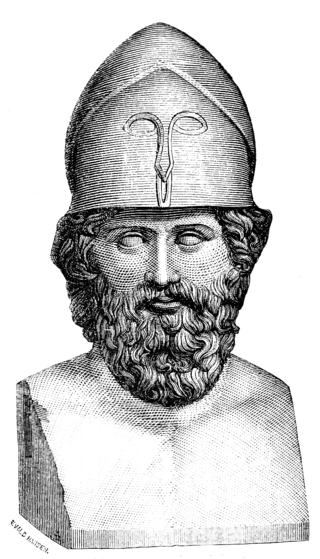
Themistocles was an Athenian politician and general. He was one of a new breed of non-aristocratic politicians who rose to prominence in the early years of the Athenian democracy. As a politician, Themistocles was a populist, having the support of lower-class Athenians, and generally being at odds with the Athenian nobility. Elected archon in 493 BC, he convinced the polis to increase the naval power of Athens, a recurring theme in his political career. During the first Persian invasion of Greece, he fought at the Battle of Marathon, and was possibly one of the ten Athenian strategoi (generals) in that battle.

Theseus was the mythical king and founder-hero of Athens. The myths surrounding Theseus – his journeys, exploits, and friends – have provided material for fiction throughout the ages.

Pericles was a Greek politician and general during the Golden Age of Athens. He was prominent and influential in Athenian politics, particularly between the Greco-Persian Wars and the Peloponnesian War, and was acclaimed by Thucydides, a contemporary historian, as "the first citizen of Athens". Pericles turned the Delian League into an Athenian empire and led his countrymen during the first two years of the Peloponnesian War. The period during which he led Athens, roughly from 461 to 429 BC, is sometimes known as the "Age of Pericles", but the period thus denoted can include times as early as the Persian Wars or as late as the following century.
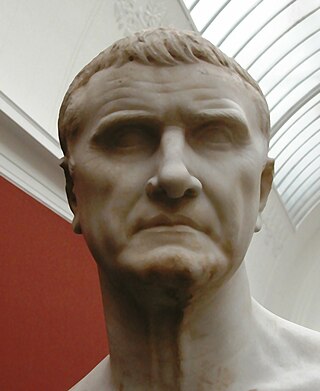
Marcus Licinius Crassus was a Roman general and statesman who played a key role in the transformation of the Roman Republic into the Roman Empire. He is often called "the richest man in Rome."

Solon was an Athenian statesman, constitutional lawmaker and poet. He is remembered particularly for his efforts to legislate against political, economic and moral decline in Archaic Athens. His reforms failed in the short term, yet Solon is credited with having laid the foundations for Athenian democracy. His constitutional reform also succeeded in overturning most laws established by Draco.

Alcibiades was a Athenian statesman and general. The last of the Alcmaeonidae, he played a major role in the second half of the Peloponnesian War as a strategic advisor, military commander, and politician, but subsequently fell from prominence.
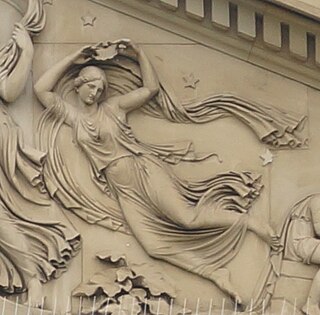
In Greek mythology, according to Plutarch, the 7th century BC Greek poet Alcman said that Ersa or Herse, the personification of dew, is the daughter of Zeus and the Moon (Selene). Plutarch writes:

Demetrius I, also called Poliorcetes, was a Macedonian nobleman, military leader, and king of Macedon. He belonged to the Antigonid dynasty and was its first member to rule Macedonia. He was the son of Antigonus I Monophthalmus and Stratonice.

Numa Pompilius was the legendary second king of Rome, succeeding Romulus after a one-year interregnum. He was of Sabine origin, and many of Rome's most important religious and political institutions are attributed to him, such as the Roman calendar, Vestal Virgins, the cult of Mars, the cult of Jupiter, the cult of Romulus, and the office of pontifex maximus.

National service is the system of compulsory or voluntary government service, usually military service. Conscription is mandatory national service. The term national service comes from the United Kingdom's National Service Act 1939.
Lycurgus was the legendary lawgiver of Sparta. He is credited with establishing the military-oriented reformation of Spartan society in accordance with the Oracle of Apollo at Delphi. All his reforms promoted the three Spartan virtues: equality, military fitness, and austerity.

The Third Servile War, also called the Gladiator War and the War of Spartacus by Plutarch, was the last in a series of slave rebellions against the Roman Republic known as the Servile Wars. This third rebellion was the only one that directly threatened the Roman heartland of Italy. It was particularly alarming to Rome because its military seemed powerless to suppress it.

Plutarch's Lives of the Noble Greeks and Romans, commonly called Parallel Lives or Plutarch's Lives, is a series of 48 biographies of famous men, arranged in pairs to illuminate their common moral virtues or failings, probably written at the beginning of the second century AD. The surviving Parallel Lives comprises 23 pairs of biographies, each pair consisting of one Greek and one Roman of similar destiny, such as Alexander the Great and Julius Caesar, or Demosthenes and Cicero. It is a work of considerable importance, not only as a source of information about the individuals described, but also about the times in which they lived.
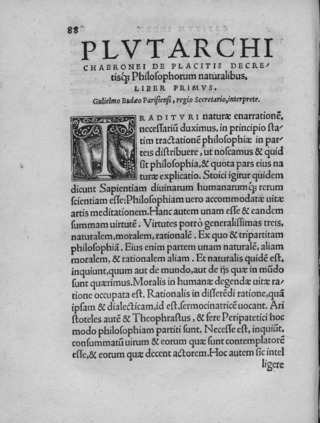
The Moralia is a group of manuscripts dating from the 10th–13th centuries, traditionally ascribed to the 1st-century Greek scholar Plutarch of Chaeronea. The eclectic collection contains 78 essays and transcribed speeches. They provide insights into Roman and Greek life, but often are also timeless observations in their own right. Many generations of Europeans have read or imitated them, including Michel de Montaigne and the Renaissance Humanists and Enlightenment philosophers.
Pseudo-Plutarch is the conventional name given to the actual, but unknown, authors of a number of pseudepigrapha attributed to Plutarch but now known to have not been written by him.
Plutarch of Chaeronea was a Greek historian, biographer, essayist, and Middle Platonist.
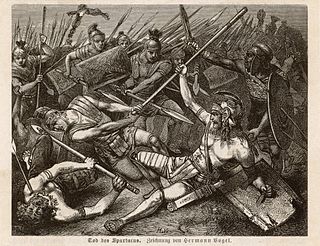
Spartacus was a Thracian gladiator who, along with Crixus, Gannicus, Castus, and Oenomaus, was one of the escaped slave leaders in the Third Servile War, a major slave uprising against the Roman Republic. Little is known about him beyond the events of the war, and surviving historical accounts are sometimes contradictory. All sources agree that he was a former gladiator and an accomplished military leader.
Dicomes was a Getian king.


















